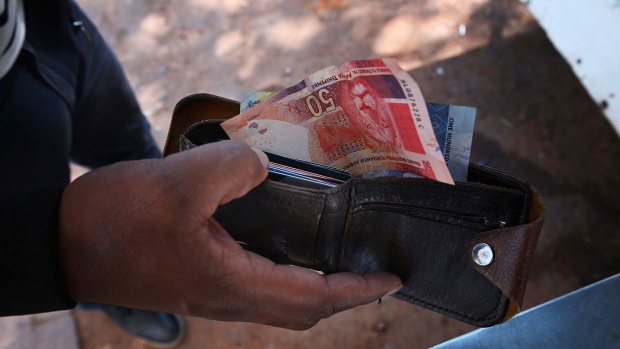Jun 27, 2024
Rand Resumes Losses as South Africa Cabinet Delay Fuels Angst
, Bloomberg News

(Bloomberg) -- Optimism sparked by South Africa’s election results is fading as a delay in the formation of President Cyril Ramaphosa’s new Cabinet makes investors worry how far it will erode the market-friendly government they had expected.
The nation’s benchmark bond yields jumped on Thursday by the most in almost 14 months and the rand headed for one of the worst losses among emerging-market peers. The main equity index slid for a third day, its longest losing streak since June 11. Credit default swaps spread on the sovereign increased by the most in two weeks.
It’s been eight days since Ramaphosa was sworn in and he still doesn’t have a functioning Cabinet as talks drag between the African National Congress and Democratic Alliance over its composition. In 2019, when Ramaphosa had enjoyed a parliamentary majority, it took only five days. Traders worry the delay this time might lead to a less desirable outcome from the markets’ perspective, even though the ANC said Wednesday an announcement would be made within 48 hours.
“Mr. Ramaphosa is famous for his consensus-seeking ways and for consulting relevant parties before making crucial decisions, but this situation requires him to make decisions without necessarily getting buy-in from everyone.” Louw Nel, Africa analyst at Oxford Economics, wrote in a note. “We think the DA is playing hardball in negotiations but does not intend to quit” the coalition, he said.
The rand fell as much as 1.4% to 18.4311 per US dollar. That put it on course for the lowest close since June 13 and the worst performance among developing-nation peers this week. The benchmark sovereign-bond yield jumped 24 basis points. The FTSE/JSE Africa All Share Index took its three-day declines to 1.6%.
Talks between the two parties stalled due to disagreements over the trade and industry ministry, people familiar with the matter said. The ANC initially offered it to the DA but withdrew after pressure from labor-union allies. The DA refused the tourism portfolio as it considers it a minor ministry.
Should the two parties — the ANC and DA — come to an agreement, investors anticipate an acceleration of economic reforms needed to address the nation’s energy crisis, fix its collapsing ports and railways, and reduce crime and corruption.
“There are two things on rand investors’ mind,” said Sebastien Barbe, the head of EM research at Credit Agricole CIB. “The composition of the government is the foremost. Even if this ANC-DA alliance has been already priced in, DA having significant economic ministries could see some upside for the rand.”
Over the long term, South Africa’s Reserve Bank hinting at possibly lowering the inflation target suggested “possibly rates higher for longer - potentially rand supportive as well when it happens,” said Barbe.
(Updates with comments and market moves)
©2024 Bloomberg L.P.







